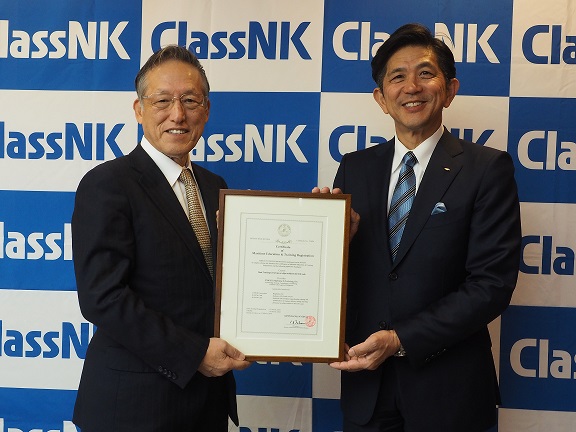A training program for seafarers responsible for liquefied natural gas (LNG) and other low-flashpoint fuels on board NYK Group-operated ships has been accredited by Nippon Kaiji Kyokai (Class NK), making NYK the first Japanese shipping company to obtain an international institution’s certification in the field of IGF Code* training.
1. Background
The use of natural gas as fuel, particularly LNG, has increased in recent years to prevent pollution, and it is said that more than 200 LNG-fuelled ships, including those on order, are currently part of the industry.
To enhance safety and minimize the risk of the rising number of LNG-fuelled ships, the International Code of Safety for Ships Using Gases or Other Low-flashpoint Fuels (IGF Code) has been adopted by the International Maritime Organization (IMO) and requires seafarers to receive training certificated by a maritime institution in their own country or the flag state.
Compared with Europe, a training system had not developed in Asia, and thus seafarers from the Philippines and India, which make up the majority of seafarers in the industry, struggled to meet the IGF Code requirement.
2. Purpose
In accordance with its medium-term management plan “Staying Ahead 2022 with Digitalization and Green,” NYK aims to proactively introduce environment-friendly ships, including those fuelled by LNG. To secure human resources that meet the requirements of the IGF Code, NYK has thus developed its own training program.
3. Outline
| Provider | NYK-FIL Maritime E-Training, Inc. ** |
| Certificate No. | 19-054, 19-054-1 |
| Courses | Basic Training for Service on Ships Subject to the IGF Code (Basic course) Advanced Training for Service on Ships Subject to the IGF Code (Advanced course) |
| Training period | Basic course: Two days Advanced course: Three days |
| Description | Pursuant to regulation of the STCW (Standards of Training, Certification and Watchkeeping) Convention, these courses meet the mandatory requirements for training for service on ships subject to the IGF Code, in accordance with provisions of Section A-V/3, Table A-V/3-1, A-V/3-2, and B-V/3. |
| Features | Those who have never handled liquefied gas are provided many demonstrations about fighting gas fires and introduced to the characteristics of liquefied gas, the influence of low temperature, and methods to detect gas. The advanced course allows participants to substitute part of the mandated shipboard experience required for advanced endorsement by the STCW by engaging in two LNG bunkering operations through a simulator. |
| Date of initial registration | March 11, 2019 |
| Certification body | Nippon Kaiji Kyokai (Class NK) |
During the training
4. Accreditation ceremony
An accreditation ceremony was held at Class NK’s head office in Tokyo.

Class NK chairman Koichi Fujiwara (left) with NYK managing corporate officer Tomoyuki Koyama
5. Future
The NYK Group will continue to obtain accreditation from other countries to secure and train seafarers. Building on the company’s basic philosophy of “Bringing value to life” and contributing to the betterment of societies, the group seeks to positively address environmental issues through the use of next generation fuels.
* International Code for Ships Using Gases and Other Low-flashpoint Fuels (IGF Code)
An international safety code that entered into force in 2017. SOLAS provides a clear legislative framework for ships to install LNG fuel systems, and STCW covers seafarer ability and training programmes.
(IGF Code ships use LNG, methanol, or other low-flashpoint fuels and do not include IGC Code ships that transport LNG and LPG.)
** NYK-FIL Maritime E-Training, Inc.
A wholly owned subsidiary of NYK-FIL Ship Management Inc. The company was founded in 2013 to train Filipino seafarers on NYK-operated vessels.
The news on this website is as of the date announced and may change without notice.

